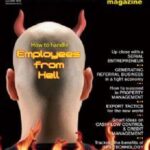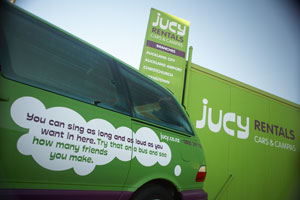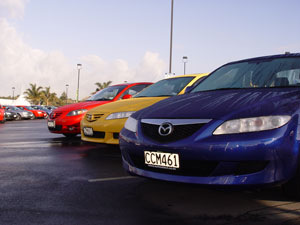LESSONS ON BUSINESS TRAVEL
The world may be in a recession, but business people still need to travel. How can business travel be streamlined in order to gain maximum business benefit whilst protecting the bottom line? This report by Vikki Bland.
|
The business travel industry has been hurting along with the leisure travel industry as companies and individuals cut down on travel to save costs. However, not travelling to meet with customers or key business partners during a recession can be detrimental to business growth, which is why smarter, not less, travel may the best answer for small businesses in 2009. Cam Wallace, general manager “The number of corporate customers searching for the best deal is greater. Some are starting to avoid peak cost flights and are planning ahead in more detail. Some are trading down from international premium economy fares to economy fares.” Matthew Mayne, CEO for Jason’s Travel Media, says business travellers are also beginning to book motels rather than incur the expense of hotels. “Motels are very buoyant in this market because business travellers that want to save money will drop a rung. Prices for business class travel have also dropped dramatically due to lack of demand and I suspect businesses are less likely to use a travel agent at the moment,” says Mayne. He says a recent Jason’s website survey of 1200 New Zealanders revealed over 80 percent intended spending the same or more on travel during Easter than last year, and a surprising 41 percent planned to spend more than last year. Part of the reason for greater spends on travel in general may be an increasing trend towards making direct, online ‘DIY’ travel bookings, which create savings when compared to paying a travel agent. Supporting this, Mayne says in March, the Jason’s online booking website received over 200,000 unique users and made $1 million in revenue for the accommodation suppliers that list with the service. ‘DIY’ travel Mayne says it’s important to understand how individual online booking engines work, as many charge a commission to accommodation or hire car providers and this is then passed on to the traveller in the online rate. “If you go to a hotel website direct, it will usually be cheaper than using an online booking service that accesses multiple hotels. In our case though, because Jason’s online booking service operates commission-free for operators, there is no premium on the online price,” says Mayne. Wallace says development of Air New “We have a system called MyAir NZ, which allows business travellers to manage their travel profiles themselves. A lot of small business customers also use our generic websites to purchase flights. Some even use [conditional discounted fare engine] GrabaSeat,” says Wallace. He says popular online services include those that allow travellers to select their seat in advance, and the ability to place feedback on specific flights or aspects of Air New Beyond airlines, there are a number of travel agencies in Some businesses take technology one step further and avoid physical travel altogether by meeting with business partners and customers via a video-conference, or online meeting and presentation tools like Webex, GoTo Meeting, or Microsoft Meeting among others. However while businesses can cut a lot of cost corners by using these services, there will always be situations for which face-to-face meetings are business critical. The agent angle Of course there are times when a business traveller thanks his or her lucky stars for having the forethought to have used a travel agent. The trick is to know when you can cut costs and corners by leaving an agent out, and when that’s unwise. Grant Bevin, MD of Business World Travel, says business travellers today know what they want from business travel service providers and tend to know travel destinations and systems, and how to go about getting through airports. They expect a travel partner to know more than they do, and to be briefed about the locations of new hotels or terminal openings. “Our challenge is to ensure we stay one step ahead with local information and knowledge,” says Bevin. That one step ahead is why many businesses still use travel agents. It is also easier to ensure a company travel policy is adhered to if an independent agent is responsible for bookings. Bevin says BWT consultants often know in advance what a company wants to spend according to the type of travel. For example, if travel is for internal administration purposes, the travel may not be tax recoverable and a consultant will negotiate with hotels and airlines to get costs as low as possible even if this creates a longer travel process for the traveller. Bevin recommends businesses of any size set up a travel policy, a brief document that covers every facet of travel and entertainment possibilities. Travel agents will usually help businesses to do this for free, or for a small fee. “There is often a need to match travel policies and options with specific employee roles.” He says businesses also need to think about the impact of travel on the traveller as well as being mindful of the bottom line. “Business travellers are away from home; have early starts and late nights; and are away from their families,” says Bevin. Angie Dudley, operations leader for FCM Travel Solutions (owned by FlightCentre) says the appeal of using a travel agent is that the business traveller then has a human advocate behind their travel arrangements. That person will have access to extended and often private travel information and resource networks. “We have a lot of people on the ground in a lot of countries saying ‘this is a good hotel’, or not a good hotel – or ‘this is rated 3-star but is only a 2-star’,” says She says travel agents typically create a profile for every new client, building up information regarding preferences and other data like frequent flyer numbers. And while websites can replicate this service (for example MyAirNZ), travel agents have the advantage of being human and able to think ‘outside the square.’ For example, “We can access important information and contact travellers in advance if we know there’s an issue. For example, when |
Bevin says BWT consultants ‘go on the trip’ with clients and want to know if there are problems. “We keep their file out on our desks all the time until the travel is completed. Sometimes business travellers need to stay another day because they are on a hot lead, or a meeting will go over time. They call us, and we sort it out for them.” Cutting the stress What reduces the stress of travel, and how can business travellers insure themselves against potential risks such as sudden illness, lost or damaged property, and changes to timetables and meeting dates? To tackle the first issue, Wallace says Air New Also possible in the future is the ability of airlines travelling between “We are encouraged and looking at it. Until then, we have Special Koru Gold check-in lounges for all international flights,” he says. Airport lounges make a big difference to the comfort of business travellers. Membership to lounges can be purchased, with many offering discounts for a specified number of memberships from the same company. Additionally, frequent flyer elite card holders usually have free access to lounges. Business travel stress can also be reduced if the person making the bookings considers the purpose of the trip and the age and needs of individual travellers. For example, third parties booking travel may select entirely on the basis of low cost, rather than select the most direct or timely route. For the business traveller, indirect routes on any form of transport can double or triple travel time and render the traveller talking gibberish with weariness and jetlag – hardly a good state to conduct business in. Tips on travel insurance It sounds boring, and it’s been said a thousand times, but it really is important to read the fine print of a travel insurance policy – particularly if you think you are automatically covered through your credit card provider. The travel specialists we spoke to for this article say credit card travel insurance policies are fine providing you know what they do and don’t cover, and what is required to initiate credit card travel insurance in the first place – credit card travel insurance cover is often only activated if key travel elements are paid for with the card. Business travellers also need to know how much equipment is covered for – a mere $500 maximum claim amount for laptops may be hidden in the fine print. Craig Morrison, CEO for Southern Cross Travel Insurance (SCTI) says insuring named individuals is suitable for most businesses, and while there are ways a business or group can cover all their staff, this is a niche type of travel insurance best addressed by a group insurance specialist or broker. A more cost effective option may be to buy a ‘Frequent Traveller’ policy for individual people. Because all types of travel including leisure are then covered for that person for a year, the policies can also be offered as an employment incentive. Other options include travel insurance designed to cover a business person working overseas for a longer period or undertaking manual work overseas. So how about your laptop or Blackberry phone? This is where it’s important to read the fine print. Morrison says SCTI’s TravelCare and Frequent Traveller policies provide a benefit of up to $5000 for laptops. If a laptop is worth more than that, a business traveller can add it to the policy as a specified item, with up to $10,000 cover in return for an additional premium. It also pays to know a little about your laptop before you lose it – Morrison says details of the computer will generally be requested at the time of a claim to verify ownership and value. As for smart phones and PDA-type devices, they may fall into a grey area. “We generally regard equipment like this to be in the mobile phone category for which a benefit of up to $2000 applies in our TravelCare and Frequent Traveller policies. [But] this does touch on an interesting topic – when does a phone become a handheld computer, or handheld computer become a laptop?” says Morrison. He says as technology evolves insurers need to ensure benefits available under their policies continue to be consistent with the nature and value of the electronic equipment travellers take overseas. Vikki Bland is an Auckland-based freelance writer. Email This article can also be accessed on the NZBusiness website: www.nzbusiness.co.nz
|





